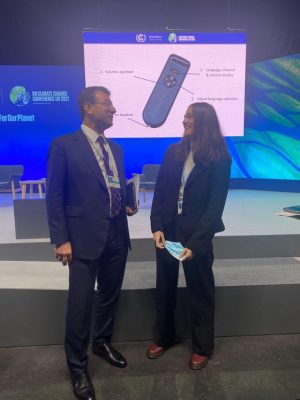by Duygu Ozcan
I wanted to join the UConn COP program to represent students who aspire to bring sustainable innovations to the business world. This year, our group is more diverse than ever because climate change is being understood across various dimensions; it is the fight of all humans and we want to contribute in each of our unique ways. Since business will always be a part of society’s drive to meet human’s needs, current and future leaders need to be equipped with the right knowledge and measures to contribute to the climate movement.
The events I attended at the COP26 climate change summit had the common goal of collaboration. They highlighted that, through overcoming differences and divisions, we can eliminate the disconnect between various groups and especially the decision makers and those who are directly affected by climate change. In the Advancing Gender Equality Conference, panelist Angelica Ponce Chambi stated that refugees, indigenous communities and people from the Global South dream to participate in the decision-making process of conferences such as COP. In another forum, panelists suggested that this disconnect can be solved through having conversations as equals and talking “with” people rather than talking to them. For a meeting featuring C40 leaders (Cities Climate Leadership Group- consisting of 97 cities around the world whose mayors are taking urgent action to confront the climate crisis), a youth activist mentioned a program where young activists meet and discuss their demands with the leaders, and they collaboratively come up with solutions. This serves as one of the examples of meaningful participation and sharing inspiring initiatives of innovation.

When collaborating, it is also important to share the stories of those who actively fight to restore the loss and damages of climate change. As the activist and poet Emtithal Mahmoud suggested, we should find inspiration in the efforts of those who provide aid to communities affected by climate change. These people often have limited resources, but they organize and help the affected populations firsthand. There should be more media coverage and storytelling of groups like such to convey the critical importance of immediate action and inspire people to support them financially. The stories should also center around affected communities and what their demands are with regards to preventing and repairing the damages so there is a complete analysis of needs.
The same collaboration work frame can apply to sustainable business models. Companies should not only collaborate with citizens but also their competitors and, in return, will achieve greater results. This year, it was the first time in 10 years that a fashion company (House of Baukjen) won the UN Global Climate Action Award. When I spoke with Geoff van Sonsbeeck (CEO), he mentioned the importance of setting a mission and following it across all functions of the supply chain. Contrary to most CEO’s visions, he actively encourages competitors or anyone else in the industry to reach out to his team so they can help them adopt to similar circular production models. Climate action should be a common goal that requires not prioritizing our own interests and when they adapted this belief, they not only contributed to a larger impact but also became more successful. By implementing a strong vision and a clear plan, they were able to reduce their carbon emissions by 50% and achieve net zero in 2 years. Within the same period, consumers recognized their efforts and their profits increased by five times. When a brand sets a standard of ethical and conscious business practices, it communicates a powerful signal for others to follow.